
The Chutes & Ladders of Learning: C@R's Annual Education Summit Recap
On Friday, June 6, CHILDREN AT RISK hosted the 2025 Education Summit: The Chutes and Ladders of Learning, bringing together educators, leaders, and advocates to examine the opportunities and challenges shaping Texas education.
On Friday, June 6, CHILDREN AT RISK hosted the 2025 Education Summit: The Chutes and Ladders of Learning, bringing together educators, leaders, and advocates to examine the opportunities and challenges shaping Texas education. Generously sponsored by Shell and supported by H-E-B, the summit explored Texas’ evolving educational landscape through expert panels on literacy, mathematics achievement, and the critical link between education and career success.
This summit was moderated by Diana Del Pilar, Chief of Academic Performance at CHILDREN AT RISK, who drew on her deep expertise in education and coaching to guide the conversation and highlight key insights from guest experts. To open the conversation, Dr. Bob Sanborn, President & CEO of CHILDREN AT RISK, offered opening remarks that connected both to the subject matter of the event, as well as the press conference directly preceding the event which focused on policy opportunities at the close of the 89th Texas Legislature.
Dr. Erin Baumgartner, Director of the Houston Education Research Consortium at Rice University’s Kinder Institute for Urban Research, opened the summit with a data-driven keynote that provided a clear snapshot of Texas’ educational landscape. She examined demographic shifts, student achievement trends, and resource allocation, emphasizing the importance of early childhood education, the needs of 1.3 million emergent bilingual students, and postsecondary readiness.
“Around 80% of school districts are in rural style areas. What students need in urban centers vs rural areas can vary, a lot,” said Dr. Baumgartner. “Just as the composition of the state is changing over time, so is the composition of our students.”


Next, the conversation moved into a panel discussion on what it takes to help students “Climb the Literacy Ladder,” moderated by Dr. Susan Lambert, Chief Academic Officer, Elementary Humanities, Amplify. This panel explored key challenges and opportunities within Texas literacy education. Leaning into evidence-based strategies, expert guests explored what it would take to close achievement gaps and build strong, inclusive literacy programs that support all students.

“What if Texas became the most literate state in the country? It would transform everything,” said Dr. Delilah Gonzales, Executive Director, Emerging Learners Literacy Foundation, National Literacy Institute; Curriculum Developer/Trainer, and Texas Southern University Professor of Early Childhood Education.
“Our children need to be critical thinkers with character. AI, if used precisely and intentionally, is important. But we need to make sure our students don’t forget to think. We need to put boundaries around that tool,” said Dr. Tracey Weeden, Past President and Ambassador, Neuhaus Education Center.
“We are great at talking about high standards, but when working with children at risk, we need to remember Maslow’s hierarchy. If a student is hungry or scared, they can’t think,” Dr. Jenny McCormack Walker, Executive Director, Literacy Texas, said. She emphasized how urgent it is to ensure students’ basic needs are met.


Following this robust conversation, summit attendees heard directly from an education leader himself in a pre-recorded interview featuring Mike Morath, Commissioner of Education with the Texas Education Agency (TEA). In this, he explored themes of high standards, academic excellence, and tailoring academic supports for all students with Dr. Bob Sanborn, President & CEO, CHILDREN AT RISK.
“There is really nothing more difficult than the job of educating not just one at a time, but 20 or 100 at a time. Nothing about this work is simple,” Commissioner Morath said.
He took time to talk about how not every student receives the same learning support or opportunities when not in the classroom, and that some students do need more rigorous support to stay on track with their peers. “Is content being taught in a way that grows [students] from a resiliency standpoint as well as a mastery standpoint?” Morath said.
Taking it back to a lived experience, the summit then transitioned to the second panel discussion of the day moderated by Jennifer Mascheck, Director of Academic Performance Coaches, Instructional and Leadership; Texas A+ Challenge. Featuring national expertise, “Calculating the Climb” focused on what it would take to build strong foundations and expand opportunities for students to pursue to advanced coursework.
Exploring the socialization impact on academic math accomplishments, expert panelists took a moment to acknowledge that every child is born with an innate sense of numbers. “Children are born with an innate sense of quantity – they know when they got something less or smaller than something else,” said Brandi Simpson, President, Texas Association of Supervisors of Mathematics; Lecturer, UTSA. She emphasized that modeling should be used as a method for students to move beyond procedures and see math instead as a tool for interacting in the world.
“I feel that math is the only content area where someone can say “I’m not good at math” – We have to change that marketing strategy. That content area is used and manipulated throughout every action, all the time,” said Latrenda Knighten, President, The National Council of Teachers of Mathematics.
“In my field of early childhood education, it wasn’t the students who carried the narrative that “I’m bad at math,” it was the teachers.” said Dr. Jie-Qi Chen, Barbara T. Bowman Professor of Early Childhood Education and Founder of the Early Math Collaborative at Erikson Institute, Chicago. “When teachers feel unsure or uncomfortable, they can unintentionally pass on the very narrative we’re trying to disrupt.”


This robust conversation looked at existing challenges while also sharing strategies to enhance engagement, support early talent identification, and ensure equitable pathways from basic math to higher-level opportunities.
Bringing the conversation full circle, the third and last panel of the day connected academic achievement to workforce outcomes. Paula Fernandez-Baca, Executive Director of College & Career Counseling & Advising, “The Winner’s Square,” addressed the vital intersection of academic preparation and workforce readiness in Texas’s evolving economy. Distinguished panelists brought lived experience representing both education and industry perspectives. This discussion focused on developing comprehensive pathways that prepare students for both immediate career entry and continued academic advancement, noting that these largely already exist and merely need to be expanded.
“We’re focusing on what we can do to expand internship opportunities, not only in higher education but in high schools,” said Mary York, Director of Workforce Development, The Texas Workforce Commission. “If we can continue to see success in current models, we have something to bring to the Texas Legislature and say ‘hey, this works.”
“The outcome data of students who go through internship opportunities is off the charts,” said Rafael Alvarez, Senior Vice President of Regional Workforce Development, Greater Houston Partnership, Houston ISD and Founder of Genysis Works. “We need to use AI to harness opportunities for students and connect them with their dream careers, and the pathways to get there.”
Panelists explored innovative approaches to career and technical education, the integration of essential soft skills into academic programs, and the development of sustainable industry-education partnerships. Experts took a moment to acknowledge the changing nature of career readiness, and emphasized the soft skills needed for students to be competitive in a rapidly evolving workforce.
“How we work is fundamentally changing, and it’s changing faster and faster,” said Anah Wiersema, Director of Program Strategy, Texas School Empowerment Network. “You’re not born adaptable; you learn that skill… And that is the biggest skill our students need to learn.”
“No student has ever failed because they don’t have technical skills. They failed because they didn’t have the soft, the durable, skills,” said Alvarez, following Wiserma’s statements. “How do we teach these, and let students experience durable skills in K-12?”
Closing out the event on a powerful note, the panelists agreed that early exposure and opportunities to ‘try out careers’ is critical. They also acknowledged that, sometimes the barriers to success aren’t the lack of opportunities, it’s the lack of awareness of an opportunity available to a student.
Click here to watch the summit recording, or explore the highlights here from C@R’s live posting on X. Keep diving into this information with the press conference on the alignment of legislation, education, and workforce readiness. Continue learning with CHILDREN AT RISK – Register for our next upcoming event, The 89th Legislative Debrief, on July 10th.

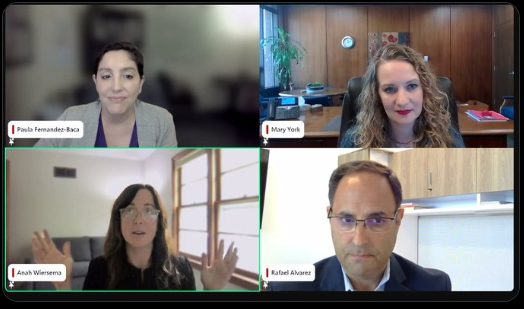
Watch the summit recording on Youtube!
READ MORE FROM C@R
Growing Up In Houston: Assessing the Quality of Life of Our Children
Data must be the catalyst for any conversation regarding the well-being of our children. However, data alone is not sufficient. We must also overlay context to better understand the complexities of the many issues facing our children. Growing Up in Houston aims to do just that.

CHILDREN AT RISK and Texas Family Leadership Council Host Third Annual State of Black Children in Texas
On Thursday, February 16, the Texas Family Leadership Council and CHILDREN AT RISK hosted the third annual State of Black Children in Texas summit. The summit explored the challenges Black children face growing up in Texas and how to best support them at all stages of...
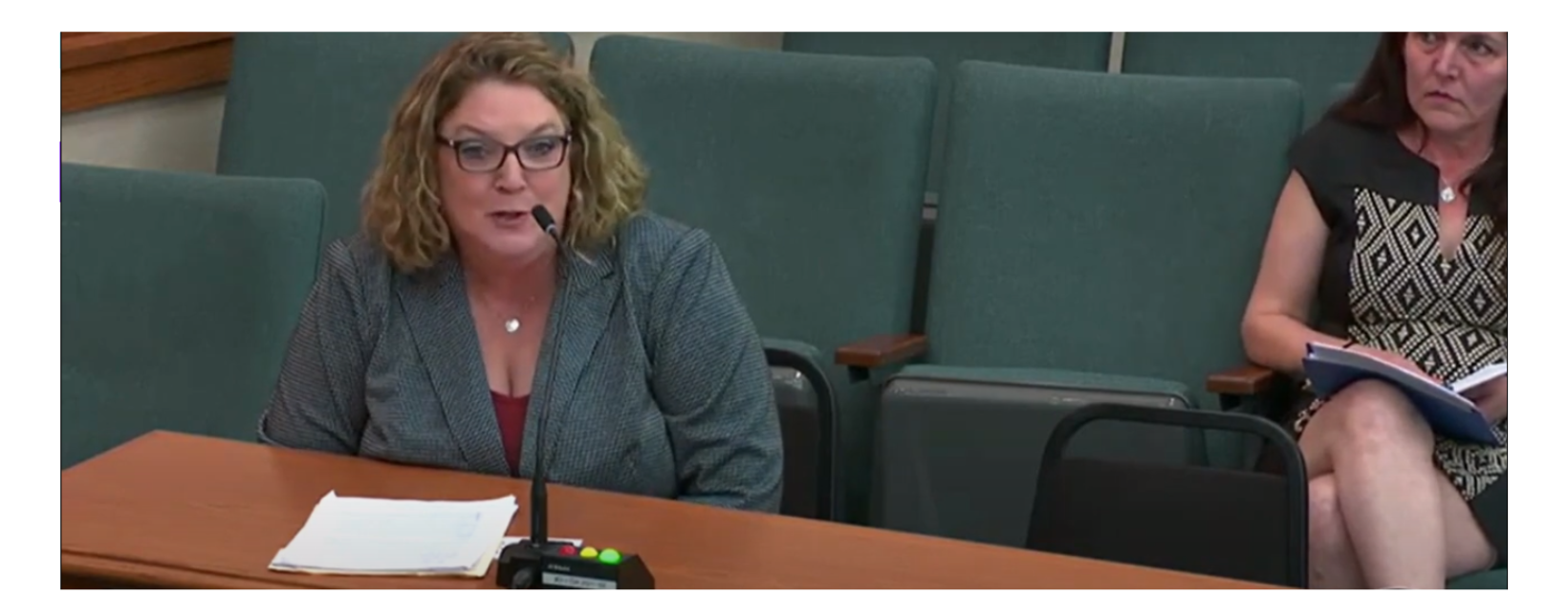
C@R Testifies to Senate Finance Committee on Education
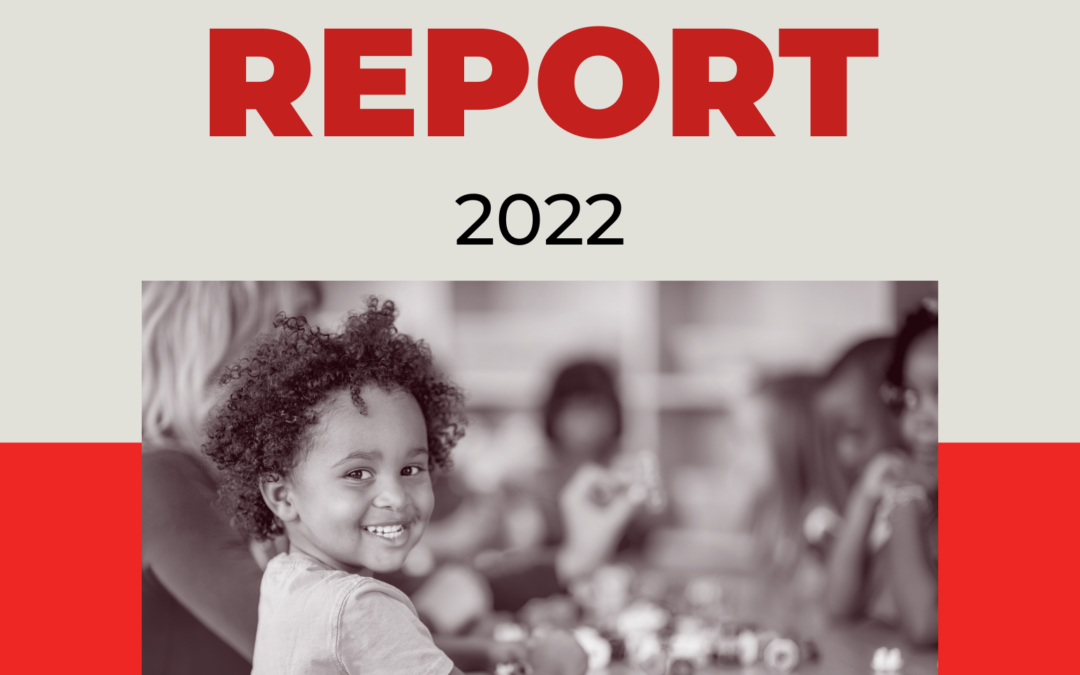
CHILDREN AT RISK Releases 2022 Annual Report
2022 was a year of huge growth for CHILDREN AT RISK, both in our work and as an agency! In addition to our main office in Houston, we are proud to report C@R now has multiple staff members based in North Texas, Central Texas, and El Paso. Having this statewide...
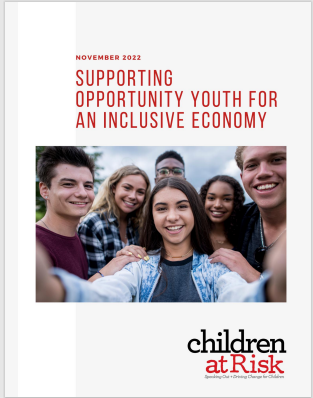
Supporting Opportunity Youth for an Inclusive Economy
Despite a decades-long drop in the opportunity youth population, which decreased from 5.8 million to 4.4 million between 2011 and 2021, the number of opportunity youth rose dramatically during the pandemic to more than 6 million. The term opportunity youth (OY)...
Una Notte in Italia Raises a Record-Breaking $540,000!
Jonathan Owens on the Una Notte in Italia runway by Charlie Horse Photos.The annual Una Notte in Italia Men’s Fashion Show and Gala, benefiting Children at Risk, has always been one of the most anticipated events of the Fall social season but this year was even more...

Education in Transition: Reshaping America’s Schools in a Post-Pandemic World
Reshaping America’s Schools in a Post-Pandemic World

REPORT: Classrooms in Crisis
COVID-19 changed our public education landscape nearly overnight. Thousands of Texas schools and nearly 5.5 million students faced a school year like never before. Schools had to quickly develop tools andresources that would support the pivot to a virtual classroom...

OP-ED: More Accountability for School Vouchers
As published in Dallas Morning News, August 31, 2022.Even as families are enjoying the first weeks of the school year, the challenges facing our education system remain more of the same. Many schools still have teacher vacancies and don’t have subject-certified...

ECE Texas Tours – Fall 2022
CHILDREN AT RISK is hosting policy roundtables in 11 major cities around Texas throughout the fall. During the roundtables, C@R will be discussing the upcoming 88th Texas Legislative Session and leading local conversations around legislative priorities to build a...
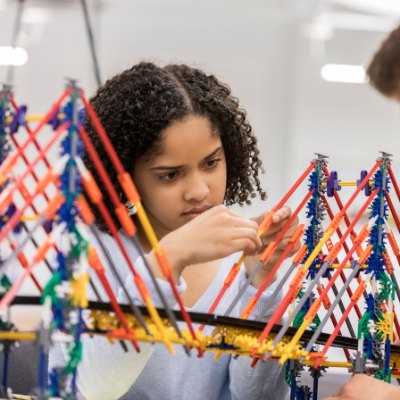
Full STE(A)M Ahead Summit
This annual summit again dove into the issues of STEM education, focusing on building a robust and qualified pipeline of professionals in the wake of the pandemic.

C@R and Partners Present Third National Immigration Summit
This year, national advocates explored child-forward immigration policies, access to basic needs and mental health resources, education equity, and how to shift the narrative surrounding immigrants and immigration.On June 23, 2022, CHILDREN AT RISK hosted their third...

Experts Gathered to Discuss the Importance of Texas Mothers During May 5 Summit
Researchers and advocates gather to discuss federal and state policy implications maternal health outcomes, family planning, and economic justice at first-ever Texas Motherhood Summit.On May 5, Children at Risk and Texas Family Leadership Council (TXFLC) presented...
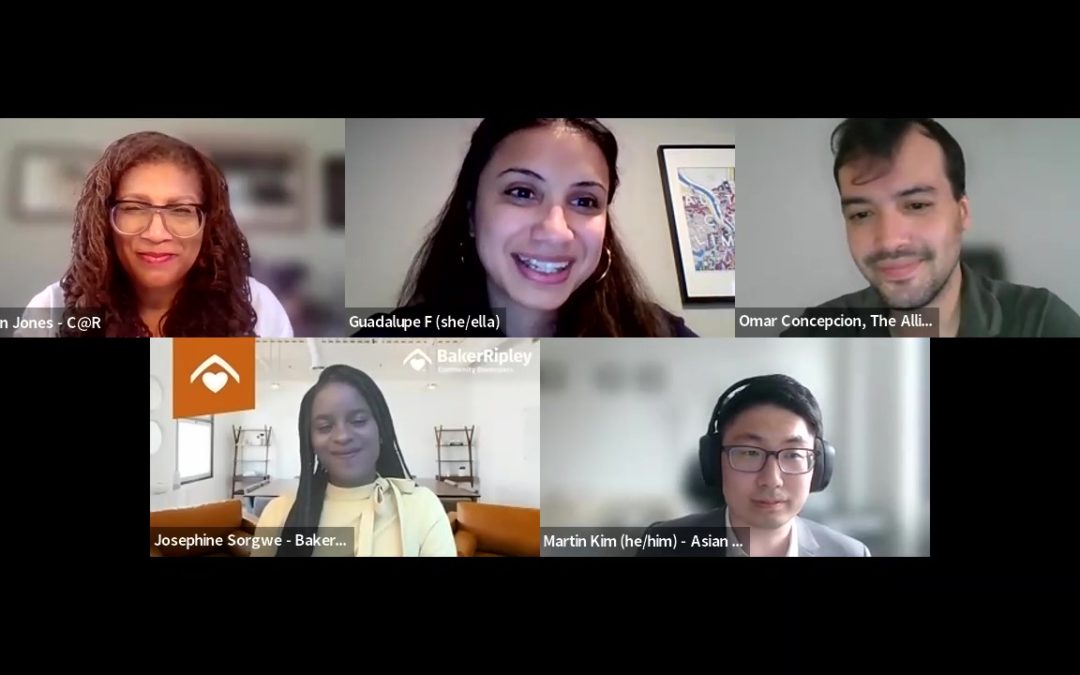
TREC Hosts Rapid Roundtable Centered on Immigration
Texas Racial Equity Collaborative (TREC) explores the intersection of the immigration and racial justice movements during June Rapid Roundtable discussion with advocates. CHILDREN AT RISK hosted its sixth Racial Equity Rapid Roundtable on June 22nd, a monthly...
